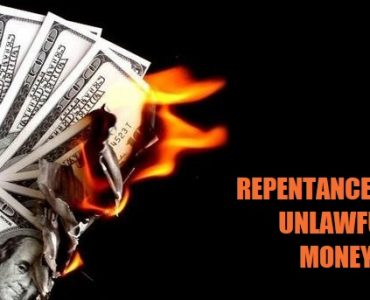The Glorified Allah commands:
“Those who eat usury cannot behave different from those who have been deceived[1] by Shaitan. This is the reason they say, “Trading is just like usury”. Allah has allowed trading and forbidden usury. To whomever an admonition from his Lord comes and he ceases usury, what has passed is his; his situation is in the hands of Allah. Whoever goes on, it is these who are from the inhabitants of hell. They will remain there forever.” (The Cow/ Bakara, 2 / 275)
The deductions of Fahreddin Razî in relation to this issue can be summarized as below:
“According to those who consider usury helal – acceptable- usury is similar to trade in all aspects. Then how is it possible for one to be helal –acceptable- and for the other to be haram- forbidden-. If it is helal –acceptable- to sell a good, whose price is 10 units in cash, for 11 units in a month’s time then the selling of 10 units for 11 units after a month should be acceptable. There is no logical difference between these two processes.”[2]
It is true that between these two processes there are similarities, but there are also dissimilarities. In fact grape and grape cider are also alike; they are both grape juice. However, due to the dissimilarities between the two it cannot be deduced that “grape cider is like wine.” The two procedures above are also different. For this reason, one of them has been called debt and the other trade. Whoever gives a loan, takes back the equivalent (amount) of hid debt. In other words, if he has given 10 units he is repaid with 10 units. Usury/ Interest is the excess that impairs this balance. If the price of a good in cash is 10 units and it is sold for 11 units to be paid in a month’s time, the price of this good becomes the whole 11 units. As there is no balance between that good and 10 or 11 units there is no excess as well.
This disparity leads to a number of other disparities. For example, trade can be instant and in cash but a debt cannot be cash. Nobody takes a loan in order to pay it instantly; even if it can be short a period of time is necessary. A vendor makes a profit of 2 units if he sells in cash and instantly a good he has taken for 8 units. Nevertheless, interest income cannot be obtained this way. This issue will be discussed in the chapter “Time Period/ Maturity Period Difference and Usury”
A second deduction of Fahreddin Razi can be summarized as follows:
“Moneylenders maintain that the reason trade is considered -helal- acceptable is related with the fact it meets the needs of people. Also usury meets the needs of people. A man who is need for money today might get hold of any possession in the future. If usury is banned this man would not be given anything from any of the rich people and he remains in trouble and need. However, if usury is allowed the owner of money gives the person in need with the hope to get more in the future. The debtor pays off his debt together with the excess rate when he gets hold of money. It is better for the person in need to pay a higher amount after he has got hold of money than being in serious need till that time. Then usury should be -helal- acceptable. As in fact the reason various types of trading are –helal- acceptable is the fact they meet the needs of people.”[3]
If the single reason for something to be -helal- acceptable is the fact it meets the needs of someone then theft, falsehood, adultery, and so on should be also –helal- acceptable. Reasonable grounds can be found for these as well.
If usury is considered the same as usury, then adultery can be considered the same as marriage. It has been reported that the Messenger of Allah claimed: “If usury and adultery come about in a society, it has deserved the punishment of Allah.”[4] Nevertheless the sexual intercourse of husband and wife is the same as the sexual intercourse between adulterers. Nevertheless, with marriage a family is established; the spouses undertake mutual rights and responsibilities, while adultery consists of a short-term pleasure. In a meeting held at Suleymaniye Vakfi in Istanbul, regarding this issue Sabri Orman maintained:
“We notice that a marital relationship is truly different from the non-marital relationship when we consider its political, economic, social, cultural and psychological consequences. The same can be said in relation to trade and usury. Both resemble each other. Yet, the structure and consequences of an interest system and an interest-free system are quite different from each other. If we follow this logical line to the end we notice that the interest-based economic system cannot possibly complement with the general structure of Islam. The prohibition of usury is the -menfi- manifestation of what has been expressed as -muspet-. In other words, if usury is not banned, the creation of a society based on the principle of brotherhood is not possible. If usury is not banned, the creation of individuals that will maintain a purely emir bilmaruf nehyi anil munkeri[5] character is not possible. These are the basis of Islam. Even though usury and trade look similar to each other, if we follow the logical thread to their consequences we will see that an economic system based on interest is totally different from an interest-free economic system. Thus, the banning of usury is one of the essential conditions of Islam.”
In the verse mentioned above, this phrase is mentioned:
“Those who eat usury cannot behave different from those who have been deceived[6] by Shaitan. This is the reason they say, “Trading is just like usury”.
The considering of usury the same as trade is truthfully an evil attitude. If they were the same, banks could also rely o trading. Today, trading is prohibited to all banks all over the world.
In countries where usury/interest is not prohibited, even though trade is permitted, in order to provide interest-bearing loans permission should be obtained by authorities. Organizations and individuals that have not received the necessary permission cannot give interest-bearing debts. This demonstrates that usury is prohibited even in these countries and can be done only under the supervision of the state. This demonstrates the universality of Koran’s prohibitions.
[1] The phrase (______) mentioned in the verse has usually been translated as “those who are touched and paralyzed/ hit by the Shaitan”. In our opinion this translation does not give the righteous meaning of the phrase. The Arabic phrase (_____) at the same time refers to (______) ( Lisanu’l- Arab, issue —), which means the persuading of someone by deceiving him.
[5] Emir bilmaruf nehyi anil munkeri means “to command the good, and ban the bad”.
[6] The phrase (______) mentioned in the verse has usually been translated as “those who are touched and paralyzed/ hit by the Shaitan”. In our opinion this translation does not give the righteous meaning of the phrase. The Arabic phrase (_____) at the same time refers to (______) ( Lisanu’l- Arab, issue —), which means the persuading of someone by deceiving him.







Add comment